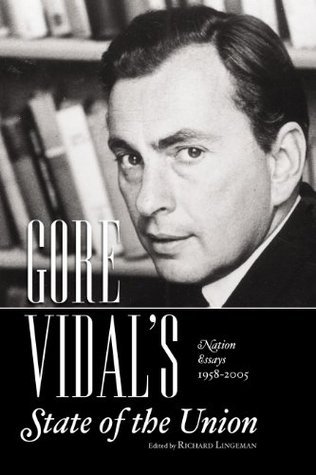
The essays collected here all appeared in The Nation magazine between 1958 and 2005. The early literary ones reflected Vidal’s status as a rising young novelist of the postwar generation, and as he expanded confidently into nonfiction, his essays range widely over politics, religion, society, manners and morals. We see him emerge as the pre-eminent essayist of his generation, winning a 1993 Nation Book Award for a collection of nonfiction works. Vidal’s Nation years—his Golden Age at the magazine—really commenced in 1981 when Victor Navasky invited him to become a contributing editor. Gore’s first contribution, “Some Jews and the Gays,” would be his most explosive one. This collection exemplifies his critical vision in great works like “Requiem for the American Empire,” “Monotheism and Its Discontents,” “Notes on Our Patriarchal State,” and the delightful “Birds and the Bees” with its Monica–Lewinsky era sequel, “The Birds and the Bees and Clinton.” Prepare to have your preconceptions challenged. Prepare also to smile or laugh out loud.
Author

Works of American writer Eugene Luther Gore Vidal, noted for his cynical humor and his numerous accounts of society in decline, include the play The Best Man (1960) and the novel Myra Breckinridge (1968) . People know his essays, screenplays, and Broadway. They also knew his patrician manner, transatlantic accent, and witty aphorisms. Vidal came from a distinguished political lineage; his grandfather was the senator Thomas Gore, and he later became a relation (through marriage) to Jacqueline Kennedy. Vidal, a longtime political critic, ran twice for political office. He was a lifelong isolationist Democrat. The Nation, The New Yorker, Vanity Fair, The New York Review of Books, and Esquire published his essays. Essays and media appearances long criticized foreign policy. In addition, he from the 1980s onwards characterized the United States as a decaying empire. Additionally, he was known for his well publicized spats with such figures as Norman Mailer, William F. Buckley, Jr., and Truman Capote. They fell into distinct social and historical camps. Alongside his social, his best known historical include Julian, Burr, and Lincoln. His third novel, The City and the Pillar (1948), outraged conservative critics as the first major feature of unambiguous homosexuality. At the time of his death he was the last of a generation of American writers who had served during World War II, including J.D. Salinger, Kurt Vonnegut, Norman Mailer and Joseph Heller. Perhaps best remembered for his caustic wit, he referred to himself as a "gentleman bitch" and has been described as the 20th century's answer to Oscar Wilde Also used the pseudonym Edgar Box. +++++++++++++++++++++++ Gore Vidal é um dos nomes centrais na história da literatura americana pós-Segunda Guerra Mundial. Nascido em 1925, em Nova Iorque, estudou na Academia de Phillips Exeter (Estado de New Hampshire). O seu primeiro romance, Williwaw (1946), era uma história da guerra claramente influenciada pelo estilo de Hemingway. Embora grande parte da sua obra tenha a ver com o século XX americano, Vidal debruçou-se várias vezes sobre épocas recuadas, como, por exemplo, em A Search for the King (1950), Juliano (1964) e Creation (1981). Entre os seus temas de eleição está o mundo do cinema e, mais concretamente, os bastidores de Hollywood, que ele desmonta de forma satírica e implacável em títulos como Myra Breckinridge (1968), Myron (1975) e Duluth (1983). Senhor de um estilo exuberante, multifacetado e sempre surpreendente, publicou, em 1995, a autobiografia Palimpsest: A Memoir. As obras 'O Instituto Smithsonian' e 'A Idade do Ouro' encontram-se traduzidas em português. Neto do senador Thomas Gore, enteado do padrasto de Jacqueline Kennedy Onassis, primo distante de Al Gore, Gore Vidal sempre se revelou um espelho crítico das grandezas e misérias dos EUA. Faleceu a 31 de julho de 2012, aos 86 anos, na sua casa em Hollywood, vítima de pneumonia.